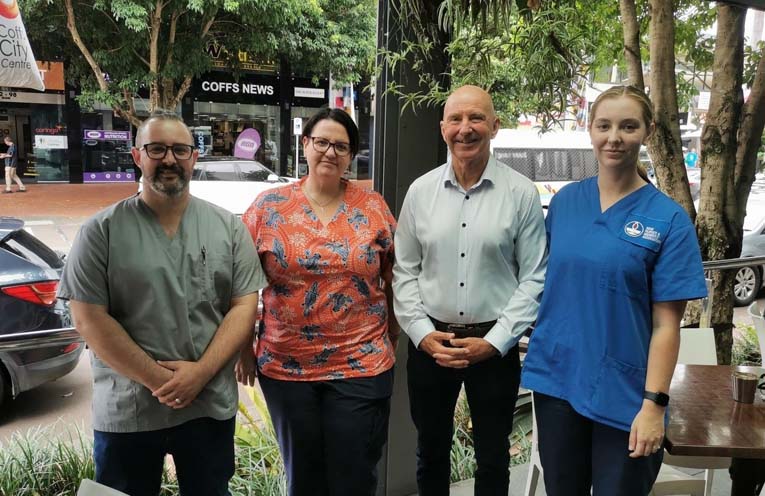
COFFS Harbour nurses say there is a staffing crisis in local hospitals and are calling for urgent action.
They say new hospital buildings are welcome, but the real need is for enough staff to do the job.
 Advertise with News of The Area today.
Advertise with News of The Area today.It’s worth it for your business.
Message us.
Phone us – (02) 4981 8882.
Email us – media@newsofthearea.com.au
“Staffing levels for nurses and midwives are at crisis point,” said Amanda Bailey Derrett, the Secretary of the Coffs Harbour Branch of the Nurses and Midwives Association.
“Some wards are operating with just over half the recommended safe level of staffing.”
Ms Bailey Derrett said nurses are working eighteen-hour shifts to cover for the shortfall and are tired, overworked and stressed.
“Studies have shown that, at the end of an eighteen-hour shift, a worker is performing with the equivalent impairment of a blood alcohol level of 0.05 percent,” she said.
“They would not be fit to drive, yet they are making critical decisions on patient care.”
According to Ms Bailey Derrett, nurses are leaving the profession in large numbers because there is “no end in sight to understaffing and no commitment from the government for safer staffing levels”.
“It’s not just nurses that deserve better, it’s also patients,” she said.
Coffs Harbour Labor candidate Tony Judge says he is appalled by the stories he hears from nurses and midwives about their lives and patient care.
“I talk with nurses regularly and have been advocating on their behalf for the last five years as a candidate, but also as a concerned community member,” Mr Judge said.
“Every time I meet with them I hear that patients are being put at risk by understaffing and overworked nurses.
“Nurses don’t want the earth, just enough staff to do the job properly.
“I don’t think that’s too much to ask,” he said.
Labor plans to increase nurse numbers to address the crisis and will introduce mandatory safe staffing levels for nurses, through shift-by-shift enforceable minimum staffing levels, according to Mr Judge.
He said that will take some of the pressure off nurses and hoped it may even encourage those who have left the profession to consider returning.
“The election is more than six weeks away, but nurses and patients are suffering from inadequate staffing levels every day.
“We need urgent action,” Mr Judge said.
Sue White, the former Secretary of the Coffs Harbour Branch of the Nurses and Midwives Association, backs the Labor plan.
“The commitment from NSW Labor goes a long way towards meeting our needs as nurses and midwives,” she said.
The Member for Coffs Harbour, Gurmesh Singh, said, “I meet regularly with nurses, doctors, medical staff and the Nurses and Midwives Association and am aware of the staffing issues in the health sector both here and nationwide caused by numerous factors, including the COVID-19 pandemic and the backlog of visas being processed.
“I’m excited to share that our health district will welcome nearly 50 new nurses and midwives over the coming weeks which will further ease pressure on staff.
“This is on top of the largest ever intake of junior medical officers being welcomed at Coffs Harbour Health Campus last month.”
Mr Singh acknowledged that attracting workforce is an enormous challenge in the bush, and said that is why the State Government announced, as part of the NSW Budget, an $883 million health workforce incentive scheme being delivered alongside new training and recruitment pathways to build a pipeline of regionally based workers and futureproof healthcare in the bush.
In addition, he said, a range of targeted measures are being funded which will support the NSW Government in building a pipeline of future nurses, doctors and other clinical staff who are based in the bush and have the skills, confidence and expertise needed to work in regional health facilities.
Mr Singh said there are also increased training positions for nursing graduates, nurse practitioners and medical interns, expanded rural generalist and procedural training positions, career development and secondment opportunities for healthcare workers based in regional NSW, including for those based in metropolitan areas to ‘try out’ working in regional NSW.
By Andrew VIVIAN